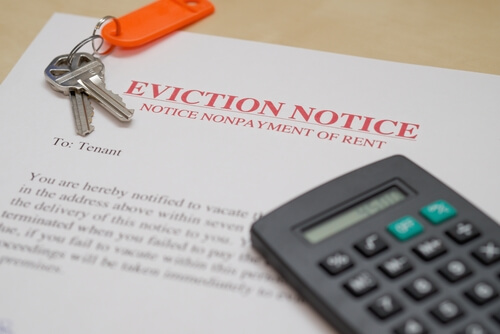Whilst never the ideal outcome when renting out your property, part of the job includes dealing with problem tenants. For a range of reasons, you may find yourself in the situation of requiring an eviction. When this occurs, the process can be complex, and in some cases will result in lengthy court cases. It’s understandable for a landlord to want to evict a tenant without going to court.
If your lodger lives with you in an excluded tenancy, you can evict the tenant without going to court. In other circumstances, the process may be more complicated. If you follow the correct processes , you won’t need legal action in order to evict a tenant. This guide can help see you through the process as smoothly as possible.
When can a landlord evict a tenant?
You may only legally evict a tenant under certain conditions. If you can’t meet them, you will face legal issues when attempting eviction; you cannot evict without a breach in tenancy agreement terms. The simplest case for eviction is once the tenancy ends and you don’t want them to continue their residency. However, if you need to remove tenants before this time, you should do so only if necessary, such as:
- Consistently late rent payments
- Failure to pay rent
- Inappropriate, anti-social, or dangerous behaviour of the tenant
- The tenant has damaged or allowed the disrepair of the property
- The tenant has violated their agreement or will not comply with its terms
- The required information or identification the tenant provided was illegitimate
How do I evict a tenant without going to court?
If you have an excluded tenancy or license, you do not have to go to court for an eviction. For example, this may be the case when you have a tenant who lives with you as a lodger. You’ll share your living areas such as kitchens and bathrooms, but hallways, landings and entrances are not included. To evict the tenant without going to court, you must give ‘reasonable notice’, either verbally or in writing. This is usually the regular period of rent payments; for example, if they pay rent monthly, the notice can be a month. Government regulations state you may change the lock to their room even if their belongings are still inside.
However, if your tenancy is not excluded, you must legally go through the courts in order to evict when required. You may carry out the eviction yourself, but this must be done very carefully, or charges can be faced for unlawful eviction or harassment of tenants.
The best method without involving the courts, if your situation qualifies, is to use a Section 21 notice. An assured short hold tenancy agreement is the most common form of rental agreement, and for this, a section 21 will notify your tenant of the eviction without actively removing them or involving court.
Free ebook: Landlord’s Guide for Tenant Evictions – Download Now
The Process of a Section 21 notice:
A section 21 notice is a message to your tenant that requests them to leave at the end of the tenancy arrangement. You can also request their leave before this date without reason, though this may not be as straightforward. It is preferable to communicate with your tenant directly to attempt a peaceful end to their residency before undergoing more formal routes. There are some conditions you should be aware of before undergoing this process:
- You can serve the notice only after the first four months of the tenancy
- Once you’ve issued the notice, it is only valid for six months.
- Once it has expired, you’ll need to repeat the process by issuing another notice
- Your notice may be invalid if your tenant has made complaints about the property to the housing authorities
Despite these limitations, this route is usually the simplest when seeking a court-free eviction process, although it may take some time.
Section 8 Notices:
You can only use a Section 8 notice once you have reason to evict, which should be stated when filling out the ‘Notice seeking possession of a property let on an assured tenancy’. Grounds that qualify for this will commonly involve failure to pay rent, damage to the property, or unacceptable behaviour. However, if the case is not urgent, it may be preferable to wait out the time until the tenancy comes to an end.
For this process, once you have a viable claim for a breach of contract, you will need to give your tenant a minimum of two weeks notice, although this could be up to two months depending on your situation.
You will then need the court to provide a possession order or an accelerated possession order which requires the tenant to vacate. However, the judge can still rule against your case at the court hearing and allow the tenant to continue to live in the property.
You can check out our blog to learn more on how much notice to give a tenant to end a tenancy.
What if the tenant refuses to leave?
Unfortunately, this complicates the process. If they refuse to vacate after you have served the eviction notice, you must involve the courts and acquire a possession order.
You have options both for standard possession (filling N5 and N119 forms) and accelerated possession, based on the conditions of each case. You may apply for the accelerated procedure if your tenant failed to comply with a Section 21 notice. The tenant is given 14 days to leave the property, and while there may not be any court appearances necessary, you will still be charged a court fee.
If it comes to it, the final stage of evicting the tenant will involve bailiffs who will actively remove the tenant for you.
How much does it cost to evict a tenant in the UK?
The costs depend on each case, its requirements, and the type of tenancy. Longer and more complex cases will likely have a higher price. It’s always best to deal with issues efficiently when they arise. If you wonder how long it takes to evict a tenant, check out our blog.
Possession orders involving the high court have a one-off fee of £66. Additional admin fees you’ll encounter as part of the process are also a possibility. Approximately, a case which involves court processes will cost around £1300- £2200 depending on the situation. Evicting a tenant without going to court will be less expensive.
Following this, if you hire a bailiff for the eviction, this will be an additional cost.
Get the right professional help
Able Investigations and Enforcements are an enforcement agency based in Bristol. We work all over the UK to provide industry-leading work in eviction processes. Our group carries out our work to the highest standards, professionally and efficiently ensuring swift resolutions to enforcement issues.
If you require active tenant removal, our specialist team will carry out the eviction safely and ethically. Able Investigations can also help with issues regarding process serving, squatters, and traveller occupation of properties.
Our group includes a Security Division as well as our Public Order Enforcement Team, specially trained in contentious matters. We are qualified and permitted to enter buildings and access land.
Don’t put yourself at risk by handling complex evictions personally! Contact us today to sort your eviction issues quickly and safely.





Comments are closed.